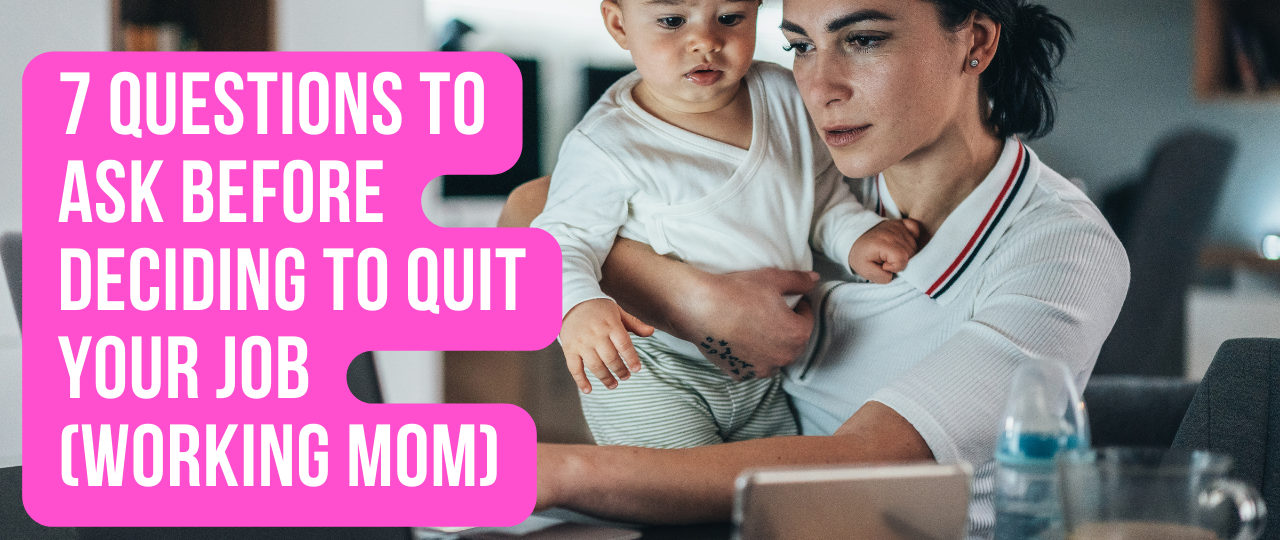Should I quit my job? It's a question many working moms ask themselves. Maybe it was when you got pregnant, gave birth, had a second child, or the press of school activities began to feel overwhelming. But quitting your job can't be an impulsive decision. It affects your family's security as well as your future career prospects. Here are 7 questions to ask yourself before you decide: "I’m going to quit my job!"
Is a Transition Making Me Want to Quit My Job?
When you're having a crisis at work or your child is struggling in school, it's easy to think, "if only I could quit my job, all these problems would go away." But if you resign rashly, you may find that underlying problems remain and you've just given up vital family income. Blaming your work -- without thinking it through -- may be a mistake.
This goes double for those major life transitions, such as returning from maternity leave, taking a new job, or changing your child's caregiver or school. It's dangerous to make a sudden decision to quit. See if you can give it another few weeks to see if things settle down.
Can I Afford to Quit My Job?
You may be dying to quit but convinced you'd default on your mortgage and car payments. But you can cut some of the monthly costs you take for granted if you think outside the box. Ask yourself:
- Can I eliminate any major life expenses, for instance by moving to a smaller house or getting rid of a car?
- Can I take on part-time work that will alleviate the drop in income? Make sure to pin down exactly what job would fill the gap -- this is not the time to count on an opportunity materializing.
- How much will I save on commuting, work clothes, child care and eating out if I quit my job? (Think about all those harried work nights when it's just easier to pick up takeout than cook a cheap, healthy meal.) Use this calculator to estimate the true cost of quitting your job. Note -- Enter the additional cost of dining out versus cooking, since even when you eat at home you're spending money.
That said, you shouldn't resign without working out a detailed budget and making sure you aren't going to go into debt by quitting.
Can I Afford Not to Quit My Job?
Or perhaps you're in a situation where you love your work but despair at how much of your income goes to child care. Remember that your budget is the tightest when your children are under 5 (or over 18, if you're paying for college.) If you have preschoolers, the cost of child care will drop dramatically once they're in public school.
Look at the long-term picture when you write that daycare check every month. It may be worth it to pay as much -- or more -- for child care as you earn, if it's only for a few years. Especially if you're in a field where employment is tight.
How Easily Can I Reenter the Workforce?
That brings us to the most critical question -- if you quit, are you cutting yourself off from working in your field in the future? In many industries, there's a clear road from education to mid-career employment, and it's impossible to break in once you step off the path.
Look around you. Do you see older moms who took some time off? Or has everyone worked steadily since receiving their degree? Perhaps you will be a trailblazer, but if you are in a field that doesn't forgive breaks in employment, you need to be realistic about your prospects for returning to work when your nest is empty.
Still, reentry isn't as big a concern if you dislike your job and are thinking about changing fields anyway. Look into the career you would like to switch to, and see if you could prepare yourself for a change while spending more time at home.
Would Quitting Endanger My Family's Security?
Maybe your husband or partner earns enough to pay your monthly bills. Or, if you're a single mom you may count on having enough freelance or part-time work to manage.
This is the time to be brutally honest. Think about the worst case scenario. If your partner were laid off, how would your family get by? Where would you find health insurance coverage? What is your safety net?
If you want to quit, make a backup plan first. I'd also advise building up your savings so you can better weather any unexpected emergencies once the family is relying on just one income, or a part-time income if you're a single mom.
Can I Scale Back Work Instead of Quitting?
Indeed, often the solution to stress over your work-family balance is not to quit, but to scale back. If you're already on the verge of giving notice, it doesn't hurt to ask about part-time or flexible options. You never know when an employer might be open to negotiating a flexible schedule.
Or maybe you can find a different job that is more flexible. Look around your organization for roles that might be at a similar level but not as demanding. Network with colleagues at other companies to see if you'd be happier somewhere else.
Would I Really Enjoy Being a Stay-at-Home Mom?
We've all had those stay-at-home-mom fantasies. You're racing to work after another bout of separation anxiety at daycare drop-off and you spot a mom playing with her child in the park. "That could be me!" you think.
Not so fast. The life of a stay-at-home mom isn't all roses and clover. There's a lot of repeating the same tasks, day after day, without much thanks. Many moms find that they enjoy their kids more by having focused time with them outside the work day. Being on duty 24-7 exhausts their patience and makes them worse at parenting.
In the end, being a hands-on mom is a short-term job. In only five years your baby turns into an elementary school student. In another 13 years she's ready to graduate high school. (If all goes well!) Don't make a decision that will have long-term implications by only considering your present situation.




















